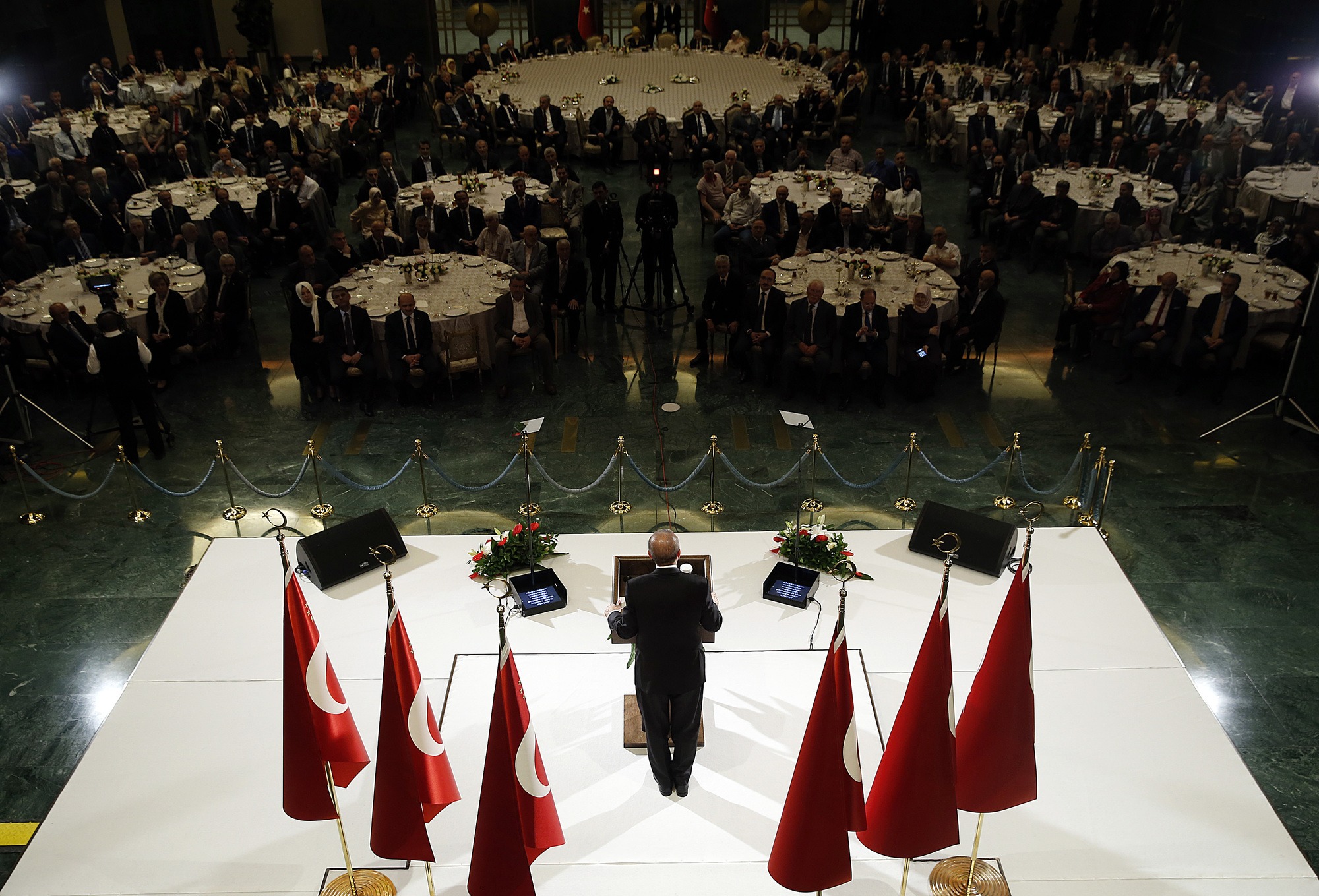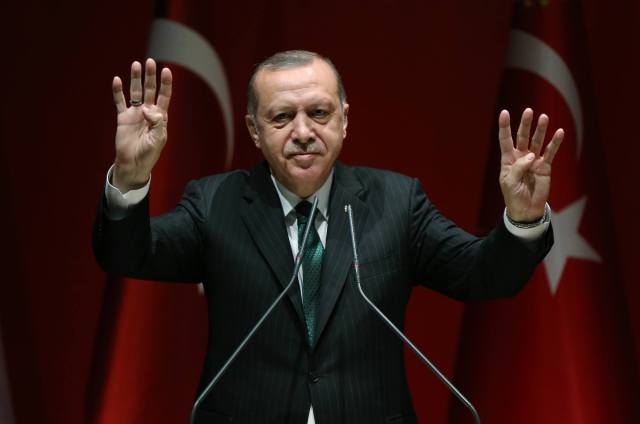Turkey’s President Recep Tayyip Erdogan. Credit: DHA/Depo Photos/ABACAPRESS.COM

If President Erdoğan wins Turkey’s presidential and parliamentary snap elections next week, he will usher in the biggest change to Turkey’s system of government since the days of Kemal Ataturk and the birth of the modern republic in 1923. His new executive system of government will abolish the post of prime minister and grand the president the power to appoint all senior officials, dissolve parliament, and rule by decree. In essence, this will be little different from how Erdoğan has ruled – with sweeping emergency powers – since the failed military coup in July 2016.
Erdoğan claims these changes are necessary to deal more effectively with the domestic and regional threats Turkey faces, depicting himself as the bulwark against the chaos of Syria or Yemen – a line employed by many autocrats in the region, as we can see in Jordan too.
He is right about the importance of Turkey. It borders Europe, is the second most powerful member of Nato, and performs security functions which no other state (not Greece, Israel, Jordan, or Saudi Arabia) could undertake in its stead. And so what happens when 60 million Turks vote next week concerns us in the West.
They vote amid a state of emergency and against a backdrop of economic turmoil. Although it was the fastest growing G20 country in 2017 (growth was 7.5%) the lira has lost 20 per cent of its value against the US dollar, inflation is in double digits, and the purchasing power of the average Turk has been eroded.
Fears that this economic crisis would degenerate, and worries about the growing appeal and strength of the opposition, explain why, in April, Erdoğan’s party, the AKP (Law and Justice Party) along with its nationalist MHP ally, Devlet Bahceli (they form the so-called People’s Alliance), brought the elections forward from the scheduled date in November 2019.
A concerned AKP sought to seize an early advantage with prime minister Binali Yıldırım filching a former CHP (the main opposition party) proposal, which the AKP had initially rejected, to promise measures to restructure (that is erase) tax and insurance premium debts to public institutions as well as traffic, election and military service avoidance fines. The government has also offered to retroactively register nearly 13 million structures built without proper title deeds. There will be a 1,000-lira handout to pensioners before the two main annual Muslim holidays each year, and the 265-lira monthly additional pensioners’ allowance will be increased to 500 liras.
To shore up support, President Erdoğan is also making much of growing prosperity on his watch. During an electoral rally in the western province of Sakarya on 5th June, Erdoğan compared figures from the start of his Justice and Development Party’s (AKP) rule in 2002 to today.
“In 2002, 91,000 cars were sold, while 723,000 cars were sold last year. Some 1,088,000 refrigerators were sold back then and 3,107,000 were sold last year. It means that there are no poor people… if there is a fridge in every house, then we are on a certain level of prosperity.”
Sceptics have quietly noted, though, that 40 years ago, not many Turks stored food in the hollows of trees. But few dare openly criticise Erdogan. Thanks to coercive takeovers, most of the media is owned by corporations sympathetic to the president, while opposition press and TV have been closed down. For two years running, Turkey has topped the league table for imprisoning journalists (73, compared with 41 in China and 20 in Egypt).
Since the 2016 coup, some hundreds of thousands of people have been subjected to legalised intimidation, with 150,000 more detained in jail. These include the leader of the pro-Kurdish HDP party, Selahattin Demirtas, who has been held in Edirne high security prison for the last two years, facing multiple charges. If he is convicted, he could be imprisoned for 142 years. Demirtas is banned from TV, but he is still campaigning via his 1.6 million Twitter followers.
Polls, though, show that Erdoğan is not having it all his own way, even in a climate in which people are cagey about revealing voting intentions to strangers. They’re proving him right to have been wary of his opponents.
He was concerned, in particular, that momentum was building behind the ‘she-wolf’, a tough devout Muslim called Meral Aksener, leader of Iyi Partior ‘Good Party’. But by focusing on her, Erdoğan has taken his eye off the real opposition challenger: Muharrem Ince of the secular, Kemalist, social democratic CHP.
Ince has proved to be a formidable campaigner, managing to shrug off the idea that all secularists are snobby Istanbul elitists. A CHP MP since 2002, the 54-year-old former physics teacher likes to say that he comes from a pious village family in which some of his female relatives wear headscarves. He makes much of his ability to drive a tractor.
Ince has been getting out and about to deliver killer blows about Erdogan’s 16 years in power, his crazy economic views, and the corrupt profligacy of his regime of pious builders. Ince likes to point out that 100,000 new homes could have been built for the $1 billion cost of Erdogan’s massive Cumhurbaşkanlığı Külliyesi (presidential complex) in Ankara, which has 1,150 rooms and 63 elevators. The water goblets cost more than many Turks earn in a year. There is also the new 300-room presidential summer palace on a bay outside Marmaris.

Public discontent is not confined to Erdoğan’s personal megalomaniac building projects. Few are thrilled about the massive public infrastructure projects – bridges and the rail link under the Bosphorus – which are indemnified with onerous toll charges while public money is splurged to cover any failures by the private sector. There’s also an obvious religious agenda attached to these projects – clearly designed to transform ‘liberal’public spaces into Islamist and neo-Ottoman ones. A park and republican-era opera house in Istanbul’s Taksim Square were bulldozed, in 2013, to make way for a neo-Ottoman barracks and a giant mosque. Critics see this as the architectural manifestation of a broader effort to refashion Turkish society in line with values of the ruling AKP, whose Directorate of Religious Affairs has one of the highest budgets of all Turkish ministries ($899 million).
This unease is reflected in the latest polls, which point to Erdoğan winning 48.3% of the vote in a first round of the presidentials, with Ince receiving 31.4 per cent. That would guarantee a second round run-off, in which opposition parties could coalesce around a single candidate. At this point much will hinge on the mood Kurdish south-east and younger Turks. Ms Aksener is unpopular with the Kurds because of her stint as Turkey’s Interior Minister in 1996-97, when she took a very unforgiving line on the Kurdish PKK. By contrast, Ince has visited Demirtas in jail, and says he wants parliament to resolve the conflict with the Kurds through negotiations. So the more conservative among them, who detest the PKK, will probably vote for Erdoğan, but others will support Ince and the CHP.
Meanwhile, in the parliamentary elections, it’s looking like the AKP and allies would not score an outright majority. The AKP is currently polling at 42.2% and its ally MHP 7.1%, with the CHP on 39.5%. Despite Demirtas being in jail, the HDP should achieve the 10 per cent needed to enter parliament. And without that majority, Erdoğan would be forced to rule by executive decree, slowing down his reforms, if not halting them.
It does look as though Turkey is proving just as impermeable to the AKP’s attempts to transform society in depth, as it proved impossible for the Kemalists to effect wholesale secularisation. Surveys of student views in the conservative imam-hatip religious schools (one of which the young Erdoğan attended) showed a shift towards ‘deism’ (a remotely omniscient deity) and a more personal, doubting, attitude towards Islam. Meanwhile, the birthrate is falling in secular cities.
While Erdoğan is likely to win the elections, whether his regime weathers the extreme volatility that is likely to afflict emerging markets in coming years seems doubtful, especially since his and the AKP’s attempts to re-engineer Turkish society are not gaining much ground. Ataturk did not succeed in vanquishing the obdurate old Turkey, but Erdoğan seems just as unlikely to be able to obliterate Ataturk’s legacy by the time the centenary of the republic is celebrated in four years’ time.










Join the discussion
Join like minded readers that support our journalism by becoming a paid subscriber
To join the discussion in the comments, become a paid subscriber.
Join like minded readers that support our journalism, read unlimited articles and enjoy other subscriber-only benefits.
Subscribe